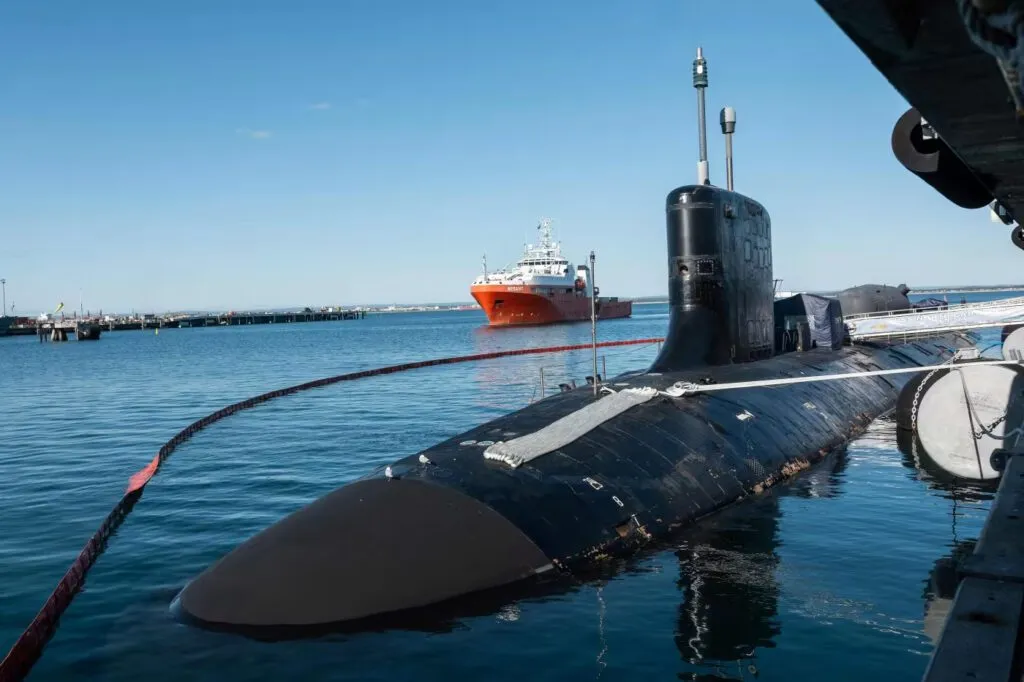Arlington Capital Partners is launching a company that seeks to build a nuclear-powered vessel supply network for the military, and the private-equity firm is backing the deal from a newly raised $3.8 billion fund.
Keel Holdings will serve as a subcontractor on key defense programs, including helping build Columbia-class ballistic-missile submarines and Virginia-class attack submarines. Much like aerospace companies have done on the commercial side, the South Carolina-based company aims to speed up vessel delivery by building an integrated supply network as the U.S. ramps up defense production.
Bethesda, Md.-based Arlington formed Keel through the merger of Pegasus Steel, which the firm acquired last year, with more recently acquired Merrill Technologies Group, in Michigan, and Metal Trades, also in South Carolina.
The firm is forming Keel as the U.S. aggressively pushes to expand and modernize its submarine fleet in the face of potential threats from Russia and China.
“The Chinese now have a fleet that’s larger than ours,” said Ben Ramundo, an Arlington principal who led the Keel investment with Managing Partner Peter Manos. “The demand to right-size that ratio is putting a lot of pressure on the supply chain.”
Ramundo added that the production strain is most acute when it comes to building submarines.
Manos, a veteran of global private-markets firm Carlyle Group who joined Arlington in 2002, said Arlington started to dig into potential investments about five years ago to address a military production bottleneck. He added that the firm zeroed in on building a company whose work centered on working with major contractors, or original equipment manufacturers,” for nuclear-powered vessels, often referred to as the “Nuclear Navy.”
Manos said Arlington plans to invest more than $400 million of equity in Keel over the length of its holding. The investment will support acquisitions to expand the company geographically and access new labor pools, as well as to build a “soup to nuts” structure that can fully outfit the large modules that are then transported to vessels for final assembly. The Merrill acquisition, for example, allowed Keel to tap in to a new pool of key workers in Michigan, Manos said.
One of the oldest private-equity investors in defense and government services, Arlington has already spent about 40% of the $3.8 billion Arlington Capital Partners VI fund, which closed above target and is more than double a predecessor vehicle that closed in 2019 with $1.7 billion in commitments. Other investments from the new fund include defense and aerospace engine parts manufacturer Kinetic Engine Systems and government-focused software provider Avenu Insights & Analytics.
Arlington Managing Partner Matt Altman said the latest fund drew a group of new investors as well as significant support from previous fund investors. He added that prior investors increased their commitment sizes by a total of about 25%. Investors that have publicly disclosed commitments to Arlington’s new fund include the California Public Employees’ Retirement System, the New Mexico State Investment Council and the Wyoming State Loan and Investment Board. Arlington itself, including its operating executives and advisers, ranks among the largest investors in the new fund, Altman said.
Founded around 1999, Arlington is run by managing partners Altman, Manos, Michael Lustbader and David Wodlinger. The firm typically takes control positions in U.S. midmarket companies and grows them through acquisitions. It focuses on regulated industries from aerospace and defense to government services and healthcare companies and emphasizes what Altman calls “purple initiatives,” investment areas with bipartisan support that are largely shielded from political dissension.
Keel’s focus puts the company squarely in that realm. The U.S. efforts to increase defense production have been beset by challenges with fewer suppliers, shipyards and workers able to meet the demand.
Eric Labs, a navy analyst for the Congressional Budget Office, previously told The Wall Street Journal that it would take the U.S. six years to build the same number of ships as China under current conditions.
The U.S. Navy has identified the Columbia-class submarine as its top priority program and plans to purchase 12 of the nuclear-powered, ballistic-missile submarines to replace the aging Ohio-class boats.
Ballistic-missile submarines are used to launch intercontinental missiles, while attack submarines are armed with cruise missiles designed to hit closer-range land and sea targets.
U.S. shipbuilder General Dynamics Electric Boat is the prime contractor for the design and construction of the Columbia-class submarines, according to government documents.
Huntington Ingalls Industries ’ Newport News Shipbuilding division is Electric Boat’s major subcontractor. Newport News also builds the Ford-class aircraft carrier.
Keel will subcontract with General Dynamics Electric Boat and HII’s Newport News Shipbuilding and predominantly focus on submarine production, Manos said. Arlington said the company has nine facilities in South Carolina and Michigan, including frontage to deep water to help with the transport to submarine and aircraft carrier customers for final assembly.
The combined company is led by Pegasus Steel Chief Executive Brian Carter, a one-time General Dynamics NASSCO executive who most recently worked for Canadian green-building startup Nexii Building Solutions.
Read more on The Wall Street Journal.
By Maria Armental
Jan. 25, 2024 7:00 am ET

